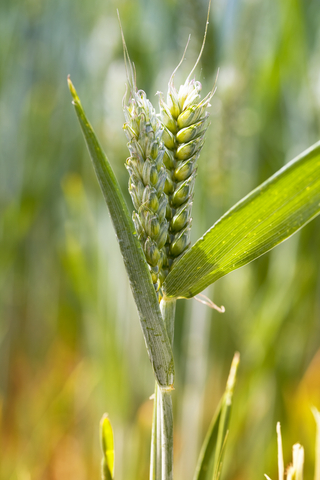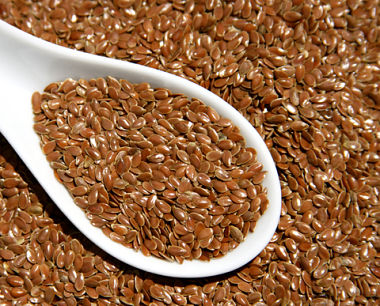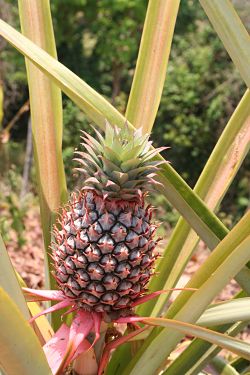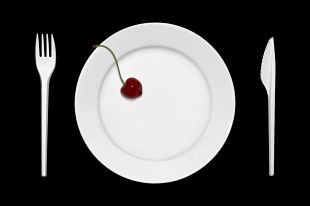Posts Tagged ‘nutrition facts’
Thursday, August 23rd, 2012

Whole grains are lovely as they grow. You can clearly see in this picture that the grains of wheat are seeds that form in a cluster on a grassy plant.
A Seed by Any Other Name is Still a Seed
Real world studies of what people eat show, over and over again, that if you consume whole grains you will be healthier and thinner. Yet outlandish statements in the popular media, and even “nutrition” books, may keep you from enjoying and benefitting from these most basic of all foods. When you know the facts, you won’t deprive yourself.
Whole grains are seeds. You might hear silly statements such as “Whole grains are not healthy, but quinoa is because it’s a seed.” If you hear anything like this, you know whoever is telling you knows zero about plants or nutrition, and you can boost your health by tuning out.
Another mundane myth is that people did not start to eat whole grains until these plants were domesticated about 10,000 years ago. Why would people have gone to all the trouble of deliberately cultivating a plant that they never ate before? Were our ancestors that misguided? The truth is that people ate wild grain seeds long before they started to plant them. In some parts of the world, wild grains still (more…)
Tags: barley, cardiovascular disease, corn, diabetes, fiber, getting healthy, lose weight, nutrition facts, oats, phytochemicals, Plant-based nutrition, quinoa, reverse chronic disease, rice, weight loss, whole foods, whole foods plant-based diet, whole grains, whole wheat
Posted in Plant-based nutrition | Comments Off on The Truth About Whole Grains
Sunday, October 2nd, 2011

This beautiful fish enjoys her ocean home, just as nature intended
Ten Reasons Seafood Is Not Safe or Appetizing
Government, media, and even health professionals flood you with advice to load up your diet with fish and fish oil. The alleged health benefits of eating fish center on a two nutrients: omega-3 fatty acids and protein.
Don’t be fooled by industry and government hype. Plants are the base of the food chain on planet earth. Plants are nutrient factories, while animals are nutrient consumers. Fish are animals, and as such get all their nutrients from plants or from (more…)
Tags: cardiovascular disease, environmental degradation, extinction, fish, fish oil, getting healthy, Janice Stanger, mercury, nutrition facts, omega-3 fatty acids, seafood safety, whole foods plant-based diet, worm larvae
Posted in Health | 9 Comments »
Sunday, September 4th, 2011

Flax seeds are tiny, but contribute much to a whole foods, plant-based diet.
Why Consuming Fish for Omega-3s Is Like Eating Radioactive Vegetables
You can’t eat a single nutrient in isolation. This includes overhyped omega-3 fatty acids. Whether you get these nutrients from food or pills, they’re part of a package.
Here’s an illustration. Just imagine for a moment you want to get more fiber into your diet and decide vegetables are the way to do this. So you buy some veggies, but they were grown near Japan’s Fukushima Daiichi nuclear plant and have low levels of radioactivity. Not enough to kill you right away, but enough to raise (more…)
Tags: cardiovascular disease, fiber, fish, fish oil, flax seeds, getting healthy, inflammation, Janice Stanger, lignans, nutrition facts, omega-6s, omege-3s, Plant-based nutrition, whole foods plant-based diet
Posted in Plant-based nutrition | Comments Off on Five Ways You Thrive with Flax Seeds for Pennies a Day
Sunday, July 24th, 2011

Dustin will be teaching us some much needed lessons in getting healthy without drugs
Dustin Rudolph Shares a Pharmacist’s Take On Whole Foods, Plant-Based Diets
Dustin Rudolph is a pharmacist who prefers plants to pills. His transformation began in February 2009 with a routine visit to his podiatrist, Dr. Sal. He ended up in a discussion on health care reform with this fellow medical professional. He was both confused and intrigued by Dr. Sal’s statement that legislation would really not have a fundamental impact on the nation’s health care practice.
Dustin ended up reading The China Study at Dr. Sal’s suggestion. At first the book’s plant-based diet approach seemed farfetched. Dustin had grown up in rural Montana on a diet heavy with animal foods. He’d also spent six (more…)
Tags: Dustin Rudolph, Janice Stanger, nutrition facts, pharmacist, Plant-based nutrition, reverse chronic disease, The China Study, whole foods plant-based diet
Posted in Health | 1 Comment »
Saturday, July 2nd, 2011

The pineapple is an attractive fruit growing on a four foot high plant. Don't you just want to grab it and bring it home?
A Special Enzyme in This Unique Food Has Profound Health Benefits
Although only four feet high, the pineapple plant grows a powerful fruit. This tropical plant, native to South America but now found in warm places around the world, blooms with red or purple flowers. The many small flowers meld together as they produce fruit. So a large pineapple is really a fusion of many smaller berries around a central stalk.
Bromelain is an enzyme that distinguishes pineapples from all other fruits. This enzyme, which your body can absorb intact, has unique and powerful effects to support your health. Pineapple is a special piece of the puzzle in putting together your ideal whole foods, plant-based diet.
To reap the advantages of bromelain, be sure to eat pineapple raw. Cooking or canning destroys this enzyme. An electric knife makes cutting whole pineapple a breeze, or you can buy fresh fruit that is already cut into chunks.
For more bromelain, eat the whole pineapple (minus the skin and leaves). The tougher circle of cells at the center of these fruits (which is actually the central stalk or stem) has more concentrated bromelain than the surrounding tender fruit has.
You can cut the stalk into small pieces or put it into a smoothie where it will be ground up. If you just (more…)
Tags: bromelain, bruises, cancer, getting healthy, inflammation, Janice Stanger, nutrition facts, pineapple, Plant-based nutrition, whole foods plant-based diet
Posted in Plant-based nutrition | 2 Comments »
Sunday, May 15th, 2011
Why Serving Sizes Undercut Health and Weight Loss

Meals limited by portion control can feel so skimpy.
Run-of-the-mill diets focus on controlling the amount you eat by limiting portions. This is an attempt to fit a manmade, arbitrary concept (“serving size”) into a natural biological system (your body). While this strategy may work for some people for a short time, the long-term outcome is often counter to health and weight goals.
The USDA’s Dietary Guidelines for Americans 2010 is typical. Some of the serving sizes this report lists include:
• Bread: one slice
• Cooked rice: half a cup
• Cut up vegetables: half a cup
• Fruit: one medium piece
• Cooked beans: half a cup
• Milk: one cup
• Cooked meat, poultry, or fish: one ounce
• Soft margarine: one teaspoon
• Sugar: one tablespoon
Here are six reasons that portion control ultimately will not succeed in getting you to a trim weight and (more…)
Tags: 2010 USDA Guidelines for Americans, getting healthy, Janice Stanger, lose weight, nutrition facts, Perfect Formula Diet, phytochemicals, Plant-based nutrition, portion control, serving size, vegetables, weight loss, whole foods, whole foods plant-based diet
Posted in weight loss | Comments Off on Six Reasons Portion Control Will Make You Overweight
Sunday, April 3rd, 2011

Whole foods are dense with calcium because plants need this mineral to survive.
Calcium Supplements May Also Make Your Body Too Alkaline
Whole plant foods contain thousands of beneficial substances, including amino acids, vitamins, minerals, essential fatty acids, complex carbohydrates, fiber, and phytochemicals, health-promoting nutrients found only in plants. These nourishing elements work together to form a vital tapestry supporting vibrant health.
Yet the media and commonplace nutritional advice focus on only a few isolated food components. Calcium is one of the most overhyped nutrients, largely because of the clout of the dairy industry. The myth is that (more…)
Tags: 2010 USDA Guidelines for Americans, acid-base balance, bone health, calcium, calcium-alkali syndrome, cardiovascular disease, getting healthy, Institute of Medicine, Janice Stanger, kidney stones, nutrition facts, Plant-based nutrition, vegetables, whole foods
Posted in Plant-based nutrition | 1 Comment »
Sunday, December 19th, 2010

Both smoking and animal foods can damage your heart and the arteries that feed it. Whole plant foods nourish your heart. Should be a simple choice.
And Two Important Ways They Are Different
The Surgeon General’s December 2010 report, How Tobacco Smoke Causes Disease, is a gift for anyone interested in health. Of course, everyone knows that smoking is “bad.” This 727 page masterpiece vividly describes exactly how and why.
The Surgeon General has yet to release a report on the perils of animal foods. Yet compelling evidence shows striking similarities between smoking and eating meat, fish, dairy, and eggs. Here are twelve parallels between these dangerous habits.
1. Both smoking and animal foods damage your body through multiple mechanisms, including causing genetic changes, inflammation, and an increase in the free radicals that cause oxidative stress. Chronic illnesses, including cancer, cardiovascular disease, reproductive problems, and aggravation of diabetes are (more…)
Tags: cardiovascular disease, cigarettes, getting healthy, inflammation, nutrition facts, Plant-based nutrition, reverse chronic disease, Surgeon General's report, tobacco, whole foods
Posted in Health | 1 Comment »
Friday, November 26th, 2010
Nuts for Nutrition and Health: It’s All In How Much You Eat

Few foods are as simple, delicious, and filling as a peanut butter and jelly sandwich. Be sure to enjoy yours on whole wheat bread. Peanuts are not really tree nuts, but have very similar nutritional properties.
Are you looking for a tasty snack that won’t boost your weight? How about a recipe ingredient that will add crunch and flavor? What if only a handful of this food could diminish your risk of having a heart attack?
Nuts were once thought to be fattening and unhealthy due to their high fat content. In 1992, researchers were intrigued when a large-scale study found that adults who regularly ate small amounts of nuts actually had lower risk of coronary heart disease than those who did not eat this food.
Since then, dozens of additional studies strongly support the conclusion that nuts boost heart health. The research is consistent. Nuts lower total and LDL (“bad”) cholesterol and this is (more…)
Tags: cardiovascular disease, getting healthy, Janice Stanger, lose weight, nutrition facts, nuts, Perfect Formula Diet, Plant-based nutrition, weight loss, whole foods
Posted in Plant-based nutrition | 1 Comment »
Saturday, October 16th, 2010
Vivid Orange Food that Is Fun to Play With

Pumpkins have a strong association with the supernatural. Yes,they are supernaturally healthful.
The traditional instruction from parents to “eat your food, don’t play with it” was not meant for pumpkins. These giant fruits, each with its own distinct form and personality, light up October with fun.
It’s hard to look at a pumpkin without smiling. These special plants give you something to smile about, because pumpkins are healthy in at least three ways.
First, pumpkins fascinate with their vivid color, intriguing forms, and range of possibilities. The idea of carving a jack-o-lantern brings out the kid in people of all ages. So pumpkins stimulate creativity.
Often the carving is a family project, an innocent way for parents, kids, siblings, and friends to work together cooperatively. The whole process ignites active engagement, fine motor skills, artistic talents, and joy. Contrast this with the passive and sedentary ways so many kids now spend much of their time. So pumpkins enhance (more…)
Tags: gardening, getting healthy, Halloween nostalgia, healthy Halloween, jack-o-lantern, Janice Stanger, nutrition facts, phytochemicals, Plant-based nutrition, pumpkins, vegetables, weight loss, whole foods
Posted in Health | Comments Off on Three Ways to Enjoy Healthy Pumpkins














